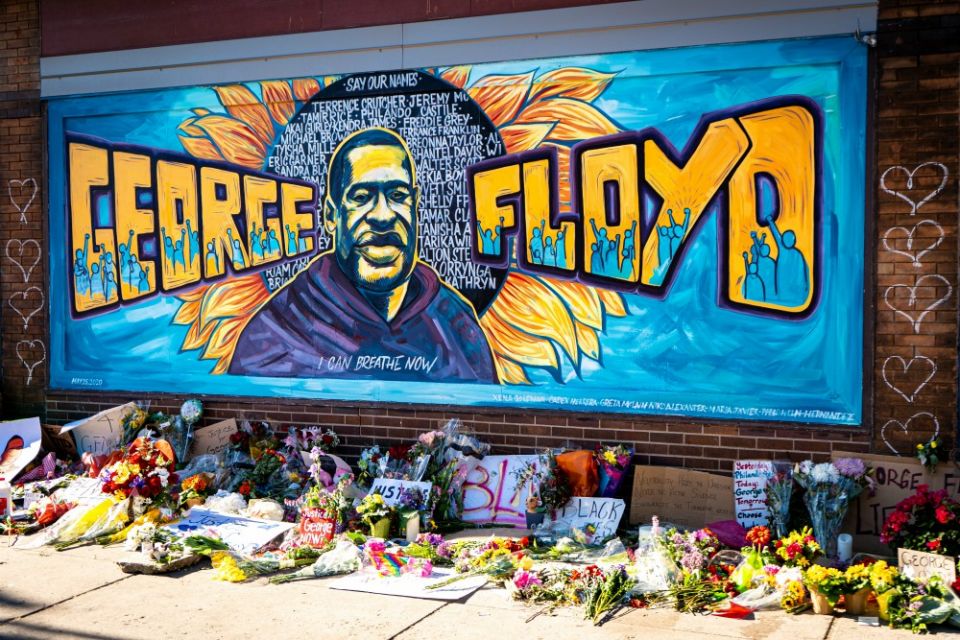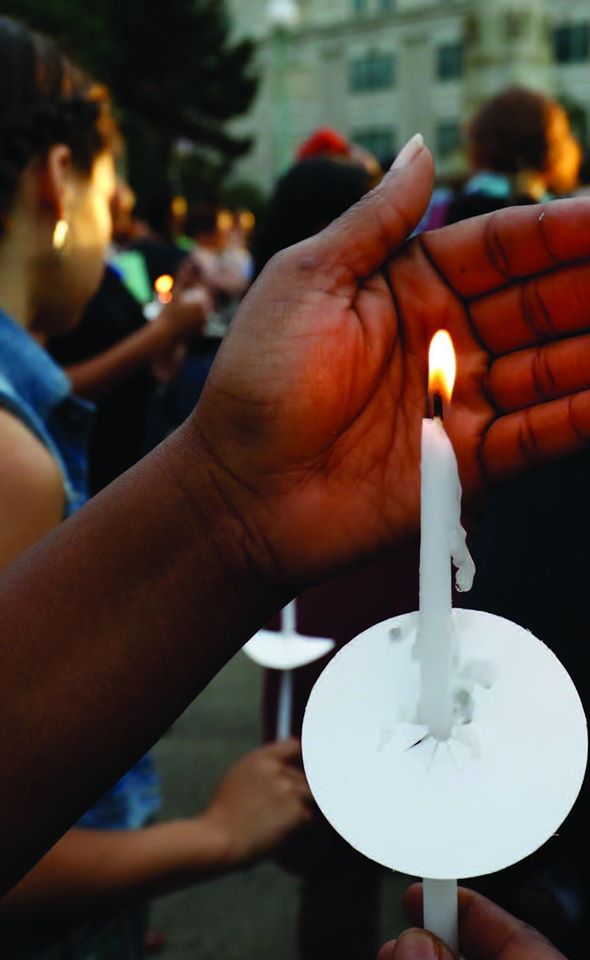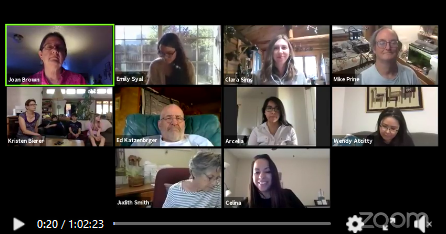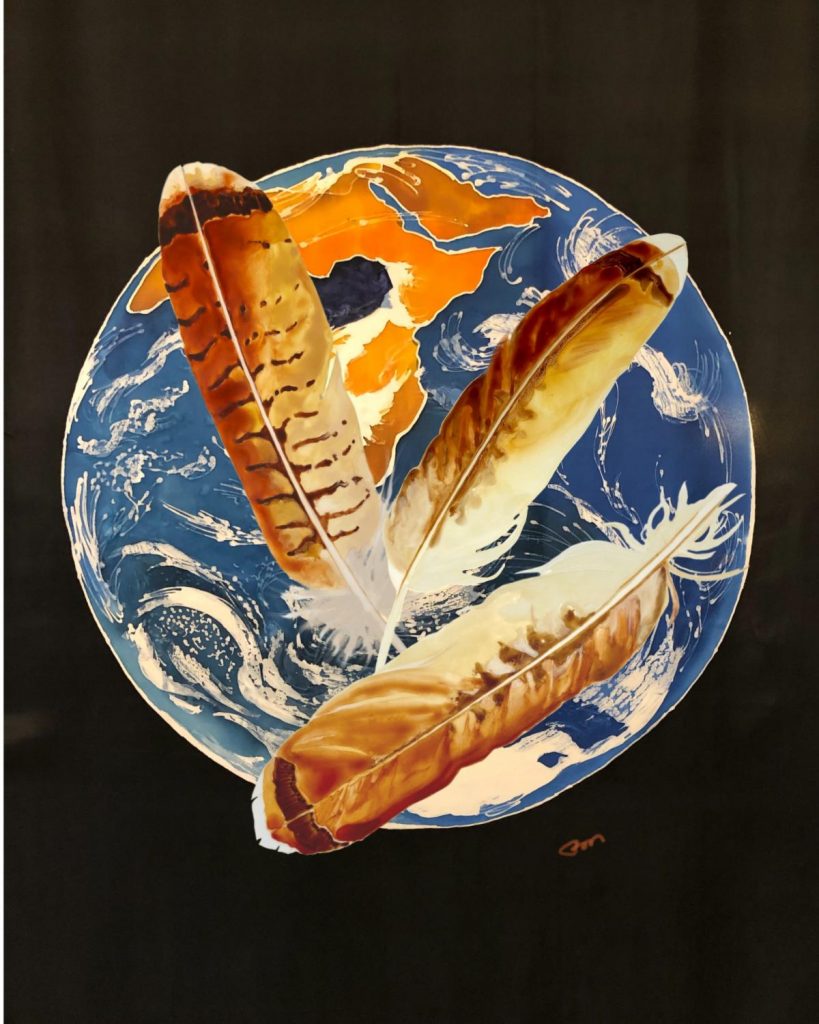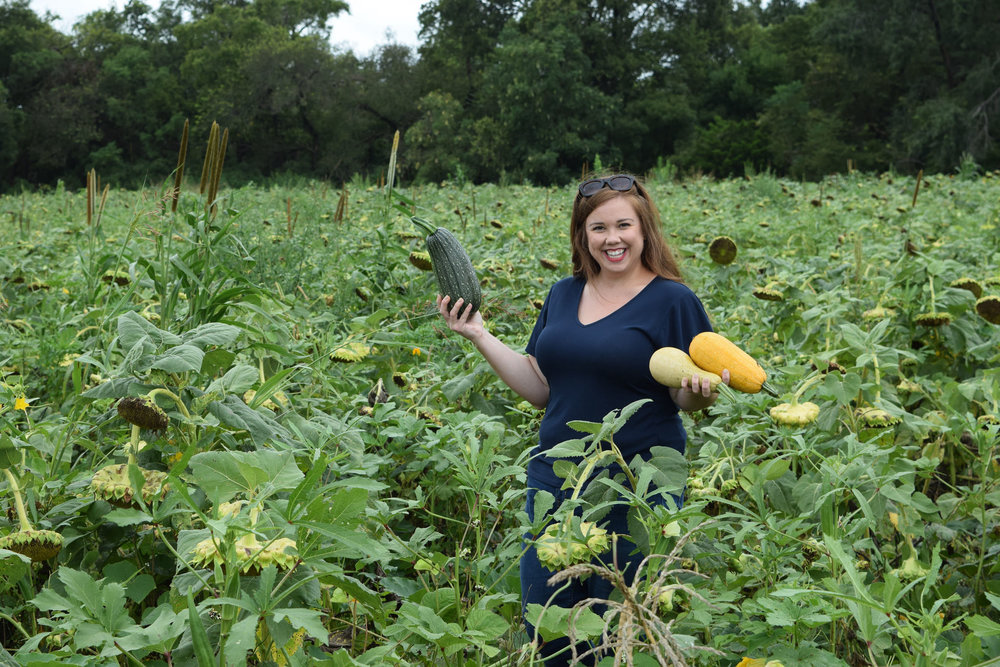(On May 20, University of New Mexico Prof. Richard L. Wood helped us commemorate the fifth anniversary of Pope Francis’ encyclical on the environment. Dr. Wood shared his thoughts online via Zoom. Here is a video. Below is the text of the presentation).
Reflections on the 5th anniversary of Laudato Si’: On Care for our Common Home, Encyclical Letter of Pope Francis
Rather than speaking directly about Pope Francis’ great encyclical Laudato Si’, I would like to frame my reflections as responses to three questions submitted by participants prior to this call, broadly around the topic of “Laudato Si’: Ecology, Economy and the way ahead”:
1. St. Francis remained with the church but was a reformer by working on the fringes, addressing economic inequity, care of those scorned by society, loving Earth, seeing entire planet as Cathedral, and living simply. How might we follow St. Francis’ example in realistic ways to do things differently in our time?
2. We are in need of transformative resilience. Maybe we are not to rebuild because we should not perpetuate climate change and economic inequity. What is the future calling us into?
3. We and our earth are experiencing major trauma. What are signs of hope and action that point to doing things differently moving into new paradigms and away from old structures and destructive ways like fossil fuels.
St. Francis, like Pope Francis, deeply experienced the joy of living in God’s love. I would like to begin my reflections there, based on Pope Francis’ other great encyclical, Evangelii Gaudium: The Joy of the Gospel. There, Francis emphasized living in daily encounter with the Spirit of Life, within the intimate flow of relationship between Creator, Christ, and Holy Spirit. One thing we can do now, every day, is to make sure we are living within that intimate flow, cultivating a spiritual practice individually and (hopefully again soon) communally that provides a bedrock of joy in our lives and relationships because we know we are loved, we know we are sinners in the arms of a forgiving God, intimately embraced by the One that theologian Elizabeth Johnson calls “She Who Is”. It is that kind of encounter, lived intimately and mystically, that I think Jesus, Francis, and Clare all lived, and into which Pope Francis is calling us today.
Do not get me wrong: I am not speaking against righteous anger at the state of our climate and at the state of our political leadership. Anger, too, can be a holy emotion when directed at injustice. But it will burn us out if we live in it too closely.
Out of the joyful encounter, we are called to be what Francis call ‘missionary disciples’ or what we might call prophets to a world in crisis: climate change, inequality, authoritarianism, now the pandemic. Perhaps all of us on this call sees ourselves as somehow engaged in those struggles; for Interfaith Power & Light that is especially about climate change and sustainability. But the struggle is long and hard, change comes slowly if at all, and the spirit wearies at times. How do we sustain ourselves and our spirits even as we work for sustainability, social justice, and deeper democracy in the world?
Perhaps we can learn from the social prophets of ancient Israel: Amos, Habbakuk, Isaiah, Jeremiah, Second Isaiah, Micah, and the rest. We tend to think of the prophets as railing angrily against social injustice, and this they did. But the great Jewish scripture scholar Abraham Heschel, in his classic work titled The Prophets, writes that though they burn with anger at injustice, anger is not the prophets’ central emotional experience. Their experience is equally rooted in God’s delight and in their own delight in God, which complements and flows alongside their anger. Rather, the prophets’ central emotional experience is their fusion with the emotional life of God, what Heschel calls “the pathos of God”. The pathos of God is rooted centrally in love for creation and for humanity, an overarching and undergirding love that transcends all failure and endures as an everlasting promise. This is where Pope Francis strives to lead each of us through his invocation of a ‘culture of encounter’—authentic encounter with that God, with the Spirit, with one another.
So my hope is that, here in this life in the present, we may each strive to live within that kind of encounter.
But what of the future? What is the future calling us into?
Beyond the immediate public health issues associated with addressing CoVid19, that is the most fundamental question we face as a society, indeed the central question facing all societies within the contemporary global economy. The pandemic and economic shutdown—what I call The Great Seclusion—allow us to ask new questions, reflect on the way ahead as we strive to help society face this question creatively.
But I am not optimistic: Habits are powerful, and the most likely future is that society goes back to its old ways. So I will speak more for difficult hope than for easy optimism. Here’s how I would describe the difference: optimism assumes things will get better; hope yearns for things to get better. Both can lead one to work hard for a better future. But optimism assumes too much good, so it often ends in the grim bitterness of disappointment. One kind of optimism would have us sit back passively and think that somehow the powers-that-be will be jolted to their senses and make wiser choices. A more common kind of optimism self-righteously thinks that we have the right views, the right analysis, and that surely this time around, if we only work hard enough and sacrifice ourselves enough, our reason will prevail and better people will be elected in November. Both kinds of optimism fail the test of experience over many years of different governments and various crises. What that experience tells us is this: as a culture we are so deeply addicted to cheap carbon, high profits, and intense consumption that any leaders we elect are unlikely to place those things at risk. So real change requires more than different leaders, and easy, immediate optimism is likely to lead us to the grim bitterness of disappointment.
In contrast, hope assumes little but yearns passionately, and the hopeful can preserve that yearning because they are grounded in something beyond the self and politics. For the prophets and for Pope Francis, real hope only emerges from the kind of encounter I described above, a graced relationship to God that allows us to be realistic about our situation as judged from the heart of God. That’s what the prophets did: they read the signs of the times and judged reality from the viewpoint and the heart of God. Likewise, Francis sees God’s judgment on the contemporary world as profoundly linking our twin crises of ecological destruction and economic inequality – as two sides of the lust for profits and power that drives our world. That lust erodes society from within because ultimately both raw profit-seeking and raw power-seeking, untamed by moral considerations, exploit society and creation without mercy. To the extent we participate in this exploitation, that lust erodes us from within because profits and power are ultimately illusory and meaningless as seen from the viewpoint of the God of history. From that viewpoint, economics and politics are meant to support human thriving, human communities, and the ecological wholeness of creation—“our common home”. Instead, our economics and politics have come to exploit human beings, distort human communities, and undermine whole ecological systems.
That is how I understand Francis’ diagnosis of our ills today, his reading of “the signs of the times.” If that is a good diagnosis (which I think it is), what might “transformative resilience” as one of you phrased it, look like? What is the future calling us into? In Francis’ terms, what are we called to become? How are we called forward by the One with whom we live, and move, and have our being, in the mystery of encounter with those we love, with the vast beauty of nature, and soon again in the Eucharist or whatever form of communion your own spiritual community practices? Let me describe where I see God’s hand at work in this moment, the kind of transformative resilience to which we might be invited: In this I draw on the writing of Martin Haalünd in This Life: Secular faith and spiritual freedom—who I think gets much right even though he gets faith rather entirely wrong.[1] As Haaglünd argues, at the core of our crisis is an entire economic system in which we measure value and quality of life according to how much we produce—literally that is what gross domestic product (GDP) measures—and how much we spend (consume). That fundamental measure now colonizes our culture and how we are governed—that is really what ‘neo-liberalism’ is: transferring economic standards of value over into all realms of life, including culture & politics. Neoliberalism has so eroded American culture that we could elect someone like the current president; it has so eroded American democracy that he can govern us as he has and still face a plausible chance of re-election.
[1] Well, not quite: his evocation of a ‘secular faith’ is quite profound and moving, an important challenge to all forms of religious faith and spirituality, one we must answer. Many forms of contemporary religion today do, I think, fall precisely into his critique. But as a radical secularist, he caricatures all religion with one broad brush, and thus entirely misses a great deal indeed. But that conversation will be for another time; his argument for an ‘economy of time’ on which I draw here does not depend on his caricature of religion.
As a result, the fundamental ill that runs deep in contemporary culture is the idolatry of productivity and profit, power and consumption over all else.[2] Call it the P3C society: productivity, profit, power, and consumption above all. That idolatry now penetrates all parts of our culture, affects us all. Left and right want to consume different things and experiences, but all want to consume more; in wanting to consume more, Democrats and Republicans and Greens and Libertarians alike are pushed to work harder, produce more, and so draw down more resources. Hope will be born to the extent we are honest about that diagnosis and see it not through a partisan lens but through the eyes of the God whose will is the thriving of all humanity. Yes, I know: In partisan terms, certainly some candidates are better than others; some policies more grounded in better science; some laws and some leaders more fair to the vulnerable and marginalized, and thus far preferable to what we have. We can and should work hard to assure that such leaders are elected and that such laws govern us. Indeed, we should use our money and our passion to help make sure of that between now and November.
But let’s be clear: our deliverance will not come from the next election, no matter who is elected. Indeed, ultimately our deliverance will not come from partisan politics at all: All of us, including the most progressive candidates out there, are beholden to a society that idolizes productivity, profit, power, and consumption. Even the progressives are mostly talking about redistribution: of money, of access to healthcare, of opportunity to play the game. Which game? The P3C game. For we can only redistribute what we produce, so even progressive policies will inevitably generate trade-offs whereby progress on things like carbon use will negatively impact profits and consumption and thus the electoral power of progressive leaders. So unless we change our culture, even progressive leaders will be unable to consistently choose sustainability and racial equity and economic justice if they want to be reelected. And if we know one thing, it is that they will want to be reelected. So until we change our culture, they will inevitably disappoint us.
That is not a reason to refuse to support progressives. We cannot run from the political struggle today, for it is part of our life in this world beloved of God, and today it is a struggle for democracy itself. We must especially support progressive policies on carbon taxation, alternative energy, strong environmental protection, an end to environmental racism, and all the rest. But our deep hope and our ultimate allegiance must not rest there, for even the champions of such policies—like us—are partly beholden to the idolatry of the day, or at least live in a world defined by the P3C idolatry. In that sense, we are indeed all in bed with idolatry and thus all sinners.
[2] It is beyond our purposes here, but I note that I do not denigrate profit, power, productivity, or consumption per se. Like markets more generally—which have lifted hundreds of millions our of extreme poverty even as they have driven others into poverty and vastly increased inequality—the P3C have roles to play in a healthy society. It is the idolatry of the P3C, their pursuit as ends in themselves that we must renounce.
We need to engage passionately in that world, fight the good fight in the name of social justice and environmental sustainability and racial equity, and ask for forgiveness for the ways we are compromised by the reality in which we live. But we must ground our ultimate hope elsewhere. Where might that be, that can sustain our deep hope? Yes, of course: in God and in Her Spirit moving in the world. But personally, I’d like a little more immediate, practical grounding too. Where might that lie?
Beyond our current reality as defined by the P3C economy, can we imagine what I will call “an economy of time”? The coronavirus pandemic and its social isolation—The Great Seclusion—have given some sectors of society the opportunity to savor a new quality of time-flow in our lives. Yes, I know: that opportunity is a product of privilege—for the less privileged, the pandemic has offered only illness, mourning, and the unfocused fear born of isolation and inept public leadership from Washington; or at best offered exhaustingly busy days pressed between childcare, eldercare, and often dangerous work. But if we are thus privileged, let’s use it for the wider good, take advantage of that new time-flow to read the signs of the times—the P3C end-times—and what lies beyond it.
Here’s my hope: that through the pandemic and beyond, we gradually construct an economy of time. In such an economy, our value and quality of life would be measured not by profit and consumption but by the total of everyone’s free time: the time people, including the most disadvantaged, can commit not to necessary labor but to pursuits we choose, pursuits we see as good in themselves. Here’s why that matters: In our P3C economy, new profits and new wages either get invested in new productivity or in new consumption; that’s just the way the economy works. Either expands our use of carbon and other resources. In an economy of time, we would still work in order to produce necessary goods, but new profits and new wages could be invested in increasing our free time, i.e. in advancing our pursuit of practices inherently valuable in themselves. Practices like communing with a natural world that is not poisoned by our wastes nor threatened by our carbon dumping into our common home.
Of course, such a vision raises all kinds of questions: What kind of policies would undergird such an economy of time? How might we identify politicians who would commit to a long-range project of building such an economy, brick by brick? How might we elect them and hold them accountable? Most fundamentally, how do we sustain ourselves and the hope for an economy of time, living as we do in a P3C world? That is, how do we live now in light of such a hope?
I do not have answers to all those questions, there lies future shared work. But we can strive to live out values linked to an economy of time now, even within current reality; that’s a bit like the role of the monasteries in Europe after the death of classic Greek and Roman civilizations, striving to preserve spiritual values until they could become the basis for a new civilization. I think somewhere in such a vision lies the kind of future for which Francis hopes, a vision beyond our P3C world, a future in which economics and politics support our communities and our common home.
If we can find ways to live out such a vision in the here and now and in ongoing encounter with God and the Spirit, it might give us the spiritual sight and the democratic energy that would allow us to gradually transform the world around us. That’s where I find hope in the world today, in communion with you all, with Francis, with Creation, and with She Who Is.
[Questions, answers, and reflections with the audience followed, available on video]
Two poems as closing reflections
And the people stayed home. And read books, and listened, and rested, and exercised, and made art, and played games, and learned new ways of being, and were still. And listened more deeply. Some meditated, some prayed, some danced. Some met their shadows. And the people began to think differently. And the people healed. And, in the absence of people living in ignorant, dangerous, mindless, and heartless ways, the earth began to heal. And when the danger passed, and the people joined together again, they grieved their losses, and made new choices, and dreamed new images, and created new ways to live and heal the earth fully, as they had been healed.”
— Kitty O’Meara (2020)
Lockdown
Yes there is fear.
Yes there is isolation.
Yes there is panic buying.
Yes there is sickness.
Yes there is even death.
But,
They say that in Wuhan after so many years of noise
You can hear the birds again.
They say that after just a few weeks of quiet
The sky is no longer thick with fumes
But blue and grey and clear.
They say that in the streets of Assisi
People are singing to each other
across the empty squares,
keeping their windows open
so that those who are alone
may hear the sounds of family around them.
They say that a hotel in the West of Ireland
Is offering free meals and delivery to the housebound.
Today a young woman I know
is busy spreading fliers with her number
through the neighbourhood
So that the elders may have someone to call on.
Today Churches, Synagogues, Mosques and Temples
are preparing to welcome
and shelter the homeless, the sick, the weary
All over the world people are slowing down and reflecting
All over the world people are looking at their neighbours in a new way
All over the world people are waking up to a new reality
To how big we really are.
To how little control we really have.
To what really matters.
To Love.
So we pray and we remember that
Yes there is fear.
But there does not have to be hate.
Yes there is isolation.
But there does not have to be loneliness.
Yes there is panic buying.
But there does not have to be meanness.
Yes there is sickness.
But there does not have to be a disease of the soul
Yes there is even death.
But there can always be a rebirth of love.
Wake to the choices you make as to how to live now.
Today, breathe.
Listen, behind the factory noises of your panic
The birds are singing again
The sky is clearing,
Spring is coming,
And we are always encompassed by Love.
Open the windows of your soul
And though you may not be able
to touch across the empty square,
Sing.
—written by Irish Capuchin Franciscan Brother Richard Hendrick (March 13th, 2020)

